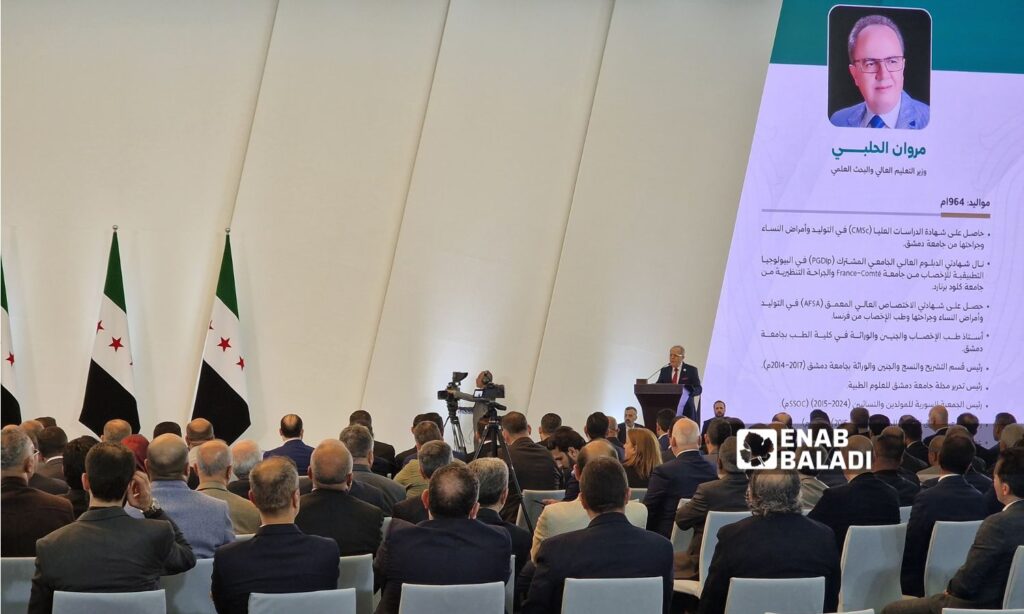Syrian transitional president Ahmed al-Sharaa announced today, Saturday, March 30, the formation of the new government, about four months after the fall of Bashar al-Assad’s regime.
The announcement ceremony for the governmental formation, attended by Enab Baladi, took place at the People’s Palace in Damascus.
There were no changes in two sovereign ministries, as Asaad al-Shibani remained Minister of Foreign Affairs, and Murhaf Abu Qasra stayed as Minister of Defense.
Changes occurred in the other ministries as follows:
- Minister of Interior: Anas Khattab
- Minister of Justice: Mazhar al-Wais
- Minister of Awqaf: Muhammad Abu al-Khair Shukri
- Minister of Higher Education: Marwan al-Halabi
- Minister of Social Affairs and Labor: Hind Kabawat
- Minister of Energy: Mohammed al-Bashir
- Minister of Finance: Mohammed Yosr Bernieh
- Minister of Economy: Nidal al-Shaar
- Minister of Health: Musab Nazzal al-Ali
- Minister of Local Administration: Mohammad Anjarani
- Minister of Emergency and Disasters: Raed al-Saleh
- Minister of Communications: Abdulsalam Haykal
- Minister of Agriculture: Amjad Badr
- Minister of Education: Mohammed Abdul Rahman Turko
- Minister of Public Works and Housing: Mustafa Abdul Razzaq
- Minister of Culture: Mohammad Yassin al-Saleh
- Minister of Sports and Youth: Mohammed Saleh Hamid
- Minister of Tourism: Mazen al-Salhani
- Minister of Administrative Development: Muhammad Iskaf
- Minister of Transport: Yarub Badr
- Minister of Media: Hamza Mustafa
During the government announcement, President al-Sharaa stated that Syria is witnessing the birth of a new phase in its national journey, pointing out that “the country faces significant challenges that require us to unite.”
He added that the formation of the new government is a declaration of the shared will to build a new state, and this government will strive to rebuild the state institutions based on accountability and transparency, and open new horizons in education and health, adding, “We will not allow corruption to infiltrate our institutions.”
Al-Sharaa emphasized that the government’s future plan will rely on axes including preserving and developing human resources, rehabilitating industry, protecting national products, creating an encouraging environment for investment in all sectors, reforming the monetary situation, strengthening the Syrian currency, and preventing manipulation of it.
The Syrian president stressed the importance of focusing on protecting citizens and enhancing stability, noting that a ministry specializing in sports and youth was created due to the importance of the youth’s role.
The announcement of the new government comes a day after President Ahmad al-Sharaa appointed Sheikh Osama al-Rifai as the Grand Mufti of the country yesterday, Friday.
The new administration announced on January 29 of last year, the appointment of Ahmed al-Sharaa as President of Syria during the transitional phase, in addition to dissolving armed factions, security agencies, the People’s Assembly (Parliament), the Baath Party, and abolishing the constitution.
Syrians were waiting for the announcement of the new Syrian government during the transitional phase, as the term of the temporary caretaker government came to an end, to address some contentious issues that have not been resolved or prioritized significantly.
The Minister of Foreign Affairs in the interim Damascus government, Asaad al-Shibani, announced on February 12 during the World Government Summit in Dubai that a new government would be formed in March that includes all spectrums and considers the diversity of the Syrian people.
Al-Shibani clarified that the new government believes in partnership with the people, learning from past mistakes to ensure the success of the upcoming phase.
Dr. Sabri Hassan, Dean of the Administrative Sciences Faculty at Ebla Private University, previously stated in an interview with Enab Baladi that the new government should implement a comprehensive strategy to ensure permanent stability and sustainable development.
Dr. Sabri added that priority should be given to building trust between the government and citizens through tangible measures, while balancing between rapid reforms (such as security) and long-term procedures (building social trust) through national dialogue, transitional justice mechanisms, and compensating victims.











